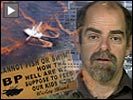
“We’ve had many deaths of humans directly attributed to this disaster,” says investigative journalist Dahr Jamail. “I recently spoke with Dr. Mike Robichaux, a doctor in Louisiana who’s treated scores of people. And he said, if we do not have federal government intervention immediately to deal with this and start treating people and start really cleaning this up appropriately, we’re going to have a lot of dead people on our hands.” [includes rush transcript]
Transcript
AMY GOODMAN: Last month, the federal government awarded its first permit for deepwater drilling in the Gulf of Mexico since lifting a moratorium imposed in the aftermath of the BP spill, which took place one year ago today. Oil giant BP recently requested permission from U.S. regulators to resume offshore drilling at 10 existing wells in the Gulf. The request comes at a time when the company faces potential manslaughter charges and other civil and criminal penalties in connection with the explosion and the death of the 11 workers last year.
Meanwhile, the liability cap for companies that cause a major spill is still just $75 million. Companies with dismal safety records can still obtain new leases.
To discuss questions of corporate responsibility and culpability and the future of offshore drilling, we’re going to turn to several people, to Keith Jones — his son Gordon, 28 years old, was killed last year on the Deepwater Horizon when it exploded. He is joining us from Baton Rouge, Louisiana. We’re also joined by independent journalist, Dahr Jamail. He has reported extensively from the Gulf Coast, and he’s joining us now via Democracy Now! video stream from his home in Marfa, Texas.
Dahr, as you listen to this broadcast, on this critical moment, the points you think that need to be raised, what has happened so far, and where we need to go?
DAHR JAMAIL: That this is — to repeat what’s already been said by a couple of other guests, that this is the biggest environmental disaster in U.S. history. From that has resulted — excuse me — the biggest petrochemical poisoning of humans in U.S. history, and also, of course, the marine life along the Gulf Coast. And we are poised now, as we’ve also heard, that because of the Obama administration’s unbridled support of the petrochemical industry and Big Oil, specifically, in this case, we are poised to repeat this disaster and have it dealt with the same way, whether it be in the Gulf of Mexico or the Arctic or somewhere in Alaska. So, I think, as we go forward, we have to continue to pay attention and hold BP to account for the massive amount of human and suffering of wildlife along the coast.
And we’ve had many deaths of humans directly attributed to this disaster, like what Mr. Matherne was telling us of his symptoms. I’ve run into that, time and time again, through my reporting along the Gulf Coast. And rather than it getting better and going away, this seems to be getting worse. I recently spoke with Dr. Mike Robichaux, a doctor in Louisiana who’s treated scores of people, including Mr. Matherne, who we heard from. And he said, if we do not have federal government intervention immediately to deal with this and start treating people and start really cleaning this up appropriately, we’re going to have a lot of dead people on our hands.












Media Options